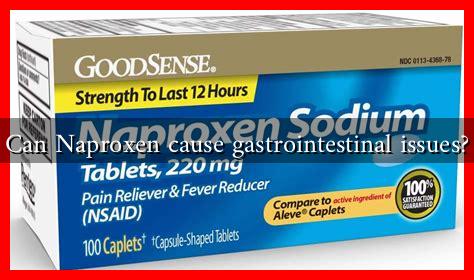-
Table of Contents
Can Naproxen Cause Gastrointestinal Issues?
Naproxen is a widely used nonsteroidal anti-inflammatory drug (NSAID) that is effective in treating pain, inflammation, and fever. While it is generally considered safe for short-term use, many patients and healthcare providers are concerned about its potential side effects, particularly gastrointestinal (GI) issues. This article explores the relationship between naproxen and gastrointestinal problems, providing insights into the risks, symptoms, and preventive measures.
Understanding Naproxen and Its Mechanism
Naproxen works by inhibiting the production of prostaglandins, which are chemicals in the body that promote inflammation, pain, and fever. By blocking these chemicals, naproxen effectively reduces pain and inflammation. However, prostaglandins also play a protective role in the gastrointestinal tract, helping to maintain the mucosal lining and regulate gastric acid secretion. When naproxen inhibits prostaglandin production, it can lead to various gastrointestinal complications.
Potential Gastrointestinal Issues Linked to Naproxen
While many individuals tolerate naproxen well, some may experience gastrointestinal side effects. The most common issues include:
- Gastritis: Inflammation of the stomach lining can occur, leading to discomfort and pain.
- Ulcers: Prolonged use of naproxen can increase the risk of developing peptic ulcers, which are sores on the stomach or intestinal lining.
- Bleeding: NSAIDs like naproxen can cause gastrointestinal bleeding, which may be life-threatening in severe cases.
- Perforation: In rare instances, ulcers can lead to perforation of the stomach or intestines, requiring emergency medical intervention.
Statistics and Case Studies
Research indicates that the risk of gastrointestinal complications increases with the duration and dosage of NSAID use. A study published in the American Journal of Gastroenterology found that patients taking NSAIDs, including naproxen, had a significantly higher incidence of upper GI complications compared to those not using these medications. Specifically, the study reported that:
- Approximately 15-30% of long-term NSAID users develop ulcers.
- About 1-2% of NSAID users experience serious GI complications, such as bleeding or perforation.
Another case study highlighted a 65-year-old male patient who developed a gastric ulcer after prolonged naproxen use for arthritis management. The patient presented with severe abdominal pain and was hospitalized for treatment, underscoring the potential risks associated with long-term NSAID therapy.
Risk Factors for Gastrointestinal Issues
Several factors can increase the likelihood of experiencing gastrointestinal problems while taking naproxen:
- Age: Older adults are at a higher risk due to decreased mucosal protection and the presence of comorbidities.
- History of GI issues: Individuals with a history of ulcers or gastrointestinal bleeding are more susceptible.
- Concurrent use of other medications: Combining naproxen with corticosteroids or anticoagulants can elevate the risk of GI complications.
- High doses and prolonged use: Higher doses and extended duration of therapy significantly increase the risk.
Preventive Measures and Alternatives
To mitigate the risk of gastrointestinal issues while using naproxen, consider the following preventive measures:
- Use the lowest effective dose: Always aim for the minimum dose necessary to manage symptoms.
- Limit duration of use: Avoid long-term use unless absolutely necessary and under medical supervision.
- Consider protective medications: Proton pump inhibitors (PPIs) or misoprostol may be prescribed to protect the stomach lining.
- Regular monitoring: Routine check-ups with a healthcare provider can help identify potential issues early.
Conclusion
Naproxen is an effective medication for managing pain and inflammation, but it is not without risks, particularly concerning gastrointestinal health. Understanding the potential side effects, recognizing risk factors, and implementing preventive measures can help minimize the likelihood of developing GI issues. If you are considering naproxen for pain management, consult with your healthcare provider to weigh the benefits against the risks and explore alternative treatment options if necessary. Always prioritize your health and well-being when using any medication.

